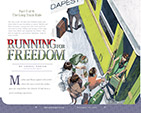Marika and Ilona sighed with relief
when the man exited the trolley just one stop before the church. It had been a
nerve-racking experience.
As the year progressed, their
weekly Sabbath journey became routine. Though they often received stares and
nosy questions, their Bibles hadn’t been discovered.
After two years in trade school the
two sisters were sent by Mama and Papa to East Germany for the summer. In many
ways it was a wonderful break. They stayed at an Adventist academy, where they
learned German and helped out in the garden, greenhouse, and kitchen. They also
made many new friends.
Each day, Marika watched out the
window and listened as students practiced beautiful hymns on their horns in the
patchy morning fog.
But there were dangers, too. Just
like Hungary, East Germany was also under Communist occupation, and the woods
were full of Russian soldiers.
One day Marika and a friend walked
several kilometers to Friedensau to explore a bookstore. They had fun, but the
walk home past the darkening woods was scary. The sounds of soldiers in the
distance made them afraid of being kidnapped or hurt. It was a great relief
when they reached the school safe and sound.
By the next fall 17-year-old Marika
and 16-year-old Ilona were back in Hungary for their third and last year of
seamstress school. As the school year continued, Marika started looking ahead.
She felt eager to make a public commitment to God, so she and Ilona began Bible
study for baptism.
On a Friday evening in late spring,
they passed the church board’s baptismal interview.
The next morning they stood with
Uncle Oszkár, who was the head pastor, in the baptismal of Hungary’s largest
Adventist church. Marika went first. She was excited, but felt scared to be in
the water, because she’d never learned to swim.
Her uncle prayed over her, and then
whispered solemnly, “Here we go.” He lowered her under the water and then
brought her slowly upright.
When she looked out at the
congregation, she could see her parents, grandparents, aunts, uncles, and
cousins, all sharing her joy. This is good, she thought. This is what I was
meant to do.
As she left the water, Uncle Oszkár
recited a Bible verse as her blessing, “Don’t let anyone look down on you
because you are young, but set an example for
the believers in speech, in conduct, in love, in faith and in purity” (1
Timothy 4:12).
One of the people watching was
Marika’s 5-year-old cousin, Zsuzsi. She’d come from West Germany to visit her
grandma and grandpa in Budapest. After church everyone gathered at their house
to celebrate.
“Mama and I are so proud of you
girls,” Papa announced. “And since Marika will soon turn 18, we’ve decided
she’s ready for some real responsibility. As many of you know, she’s been
invited to stay in her uncle Péter’s home in West Germany for one year, to care
for Zsuzsi and her sisters. Well, after much prayer, her mother and I have
decided to let her go.”
Marika’s heart jumped with
excitement. She looked around at her extended family and found Zsuzsi hiding in
Grandma’s long skirts, eyes peering out from behind blond bangs. She offered
the little girl an encouraging smile. This would be an adventure!
But before they could leave, there
was much to do. Most important, Marika needed an exit visa to legally leave
Hungary. Normally visas were very hard to get because the government wasn’t
willing to give up even a single member of its workforce—there was always a
chance they wouldn’t return. But Marika’s boss at the seamstress shop knew a
woman who could help.
By the time other preparations were
complete, Marika had her visa. After finishing her final sewing project, a
special new dress for Grandma, there was graduation, and then she was ready to
leave.
On a hot June morning Marika stood
with her family on the train station platform, nervously holding Zsuzsi’s hand.
In the distance she heard the approaching train whistle. When the train rumbled
into the station and the crowds of boarding passengers moved forward to its
open doors, Marika wondered again if this trip was God’s will.
“Don’t worry,” Mama said, squeezing
Marika’s hand. “You have everything you need. I packed a good lunch so you
won’t have to waste money on train food. You’ll be fine.”
Marika hugged everyone goodbye.
Papa helped them board the train,
find good seats, and stow their bags.
“Now I can say I was on a train
that went to the West!” Papa laughed. “This is a great opportunity for you,
Marika. And remember, my brother Péter will meet the train. Just make sure your
papers are in order when you cross the Austrian border. Those officials are
strict about paperwork. We’ll be praying for you.”
After one last hug, Papa left. A moment later the train lurched forward, and they were off.
For the next few hours, Marika
passed the time drawing pictures on a pad of paper, reciting nursery rhymes,
and telling Zsuzsi stories about growing up in Hungary.
In time they ate Mama’s delicious
cheese sandwiches, sliced apples, and honey-sweetened cookies. From the window,
they could see a series of small towns, farms and open fields, and dense woods.
When darkness fell, Marika thought
about the border. It wouldn’t be long now. Will the guards be satisfied with
our paperwork? Or will they force Zsuzsi and me to return to Budapest?

